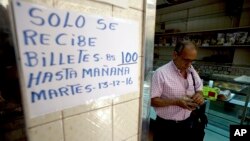Venezuela became a country without cash Friday.
As the country's most widely used banknote went out of circulation, the higher-denomination bills that were supposed to replace the 100-bolivar note had not yet arrived at banks or ATMs. In the capital, people were relying on credit cards and bank transfers, or avoiding making purchases altogether.
President Nicolas Maduro made a surprise announcement Sunday that the 100-bolivar note would go out of circulation by the week's end amid the world's highest inflation. He also temporarily closed the border with Colombia and Brazil, and then on Thursday night extended the border closure for another 72 hours.
Maduro said says the closure was needed to thwart "mafias'' who hoard bolivars. Critics mocked the notion that gangsters would choose to keep their wealth in the world's fastest-devaluing currency. The 100-bolivar bill - until now the country's largest denomination - is worth little more than 2 cents, down from 10 cents at the start of the year.
The embattled socialist president held up a new 500 bolivar bill on his television show Thursday, promising the new banknotes would soon be in wide circulation and offering to temporarily cut sales tax for credit card transactions. But on Friday, ATMs were still issuing only the now-worthless 100-bolivar notes.
Venezuelans waited in lines hundreds of people long all week to deposit their cash. On Thursday, shopkeepers put up signs saying 100-bolivar bills would no longer be accepted. That meant many people looking to buy groceries or take taxis were out of luck, as banks had run out of lower-denomination bills like 50 and 20-bolivar notes during the week, and had not yet received the higher-denomination replacements.
Amid the currency chaos, the U.S. cautioned citizens against visiting the economically spiraling South American country.
"Political rallies and demonstrations occur with little notice, and are expected to occur with greater frequency in the coming months,'' the State Department said in a travel warning. ``If security climate worsens, US citizens should note they're responsible for arranging their own travel out of Venezuela.''
But there was little sign of political activity of any kind Friday, as people scrambled to figure out how to exchange bolivars for goods and services in an economy essentially operating without paper money.
Venezuelans Scramble as Most-used Banknote Becomes Void

CARACAS, VENEZUELA —



